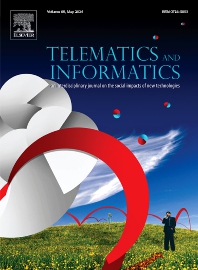Journals in Database management
Journals in Database management
Telematics and Informatics
An Interdisciplinary Journal on the Social Impacts of New TechnologiesTelemati... and Informatics is an interdisciplinary journal publishing innovative theoretical and methodological research on the social, economic, geographic, political, and cultural impacts of digital technologies. Application areas include smart cities, sensors and information fusion, the digital society and digital platforms, internet of things (IoT), cyber-physical technologies, privacy, knowledge management, distributed work, emergency response and hazards, mobile and wireless communications, health informatics, psychosocial effects of social media, ICT for sustainable development, blockchain, e-commerce, and e-government.The journal favors research papers (8,000 words), but will consider contributions offering systematic review and meta-analysis (10,000 words), as well as research notes (4,000 words) that seek to advance new ideas, theoretical perspectives or methodological approaches.Telematic... and Informatics serves as an international outlet for information scientists, data scientists, computer scientists, social informaticists, geographic information scientists, urban and regional planners, policy analysts, regional scientists, disaster scientists, and network scientists.- ISSN: 0736-5853

Data & Knowledge Engineering
Database Systems and Knowledgebase Systems share many common principles. Data & Knowledge Engineering (DKE) stimulates the exchange of ideas and interaction between these two related fields of interest. DKE reaches a world-wide audience of researchers, designers, managers and users. The major aim of the journal is to identify, investigate and analyze the underlying principles in the design and effective use of these systems. DKE achieves this aim by publishing original research results, technical advances and news items concerning data engineering, knowledge engineering, and the interface of these two fields.DKE covers the following topics:Representatio... and Manipulation of Data & Knowledge: Conceptual data models. Knowledge representation techniques. Data/knowledge manipulation languages and techniques.Architect... of database, expert, or knowledge-based systems: New architectures for database / knowledge base / expert systems, design and implementation techniques, languages and user interfaces, distributed architectures.Constr... of data/knowledge bases: Data / knowledge base design methodologies and tools, data/knowledge acquisition methods, integrity/security/m... issues.Applications, case studies, and management issues: Data administration issues, knowledge engineering practice, office and engineering applications.Tools for specifying and developing Data and Knowledge Bases using tools based on Linguistics or Human Machine Interface principles.Communica... aspects involved in implementing, designing and using KBSs in Cyberspace.Plus... conference reports, calendar of events, book reviews etc.- ISSN: 0169-023X
